Education
‘So aware of their emotions’: Pupils are standout stars in new series about Yorkshire academy | Television
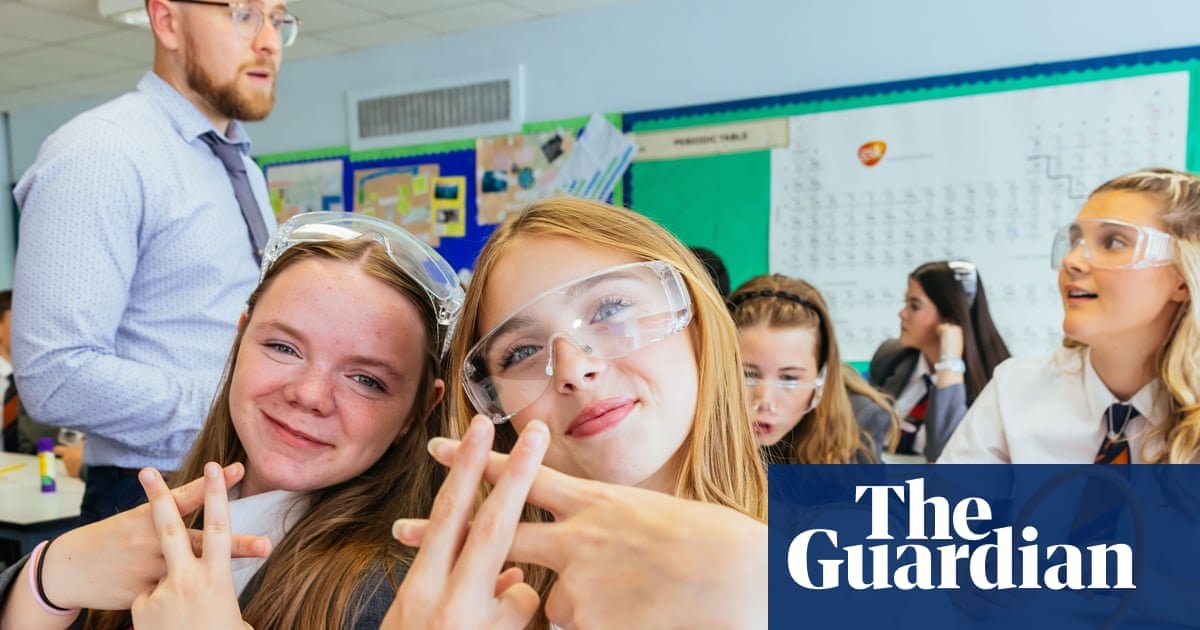
“Basically, there’s summat wrong with me. I’m like … a psychopath. Genuinely!” A teenage girl with the face of an angel is confiding in Mr Wilson, one of the student managers. He listens solemnly, but his mouth twitches with the beginnings of a smile.
“I’m going to start by disagreeing with you,” he says with all the seriousness he can muster. “You’re not a psychopath.” The girl in the sky-blue hoodie relaxes and rewards him with a broad smile.
Welcome back to Thornhill Community academy on the outskirts of Dewsbury for Educating Yorkshire Part 2, where once again the 900 pupils – witty, sensitive, smart, vulnerable and endlessly engaging – are the standout stars of the series.
Much has changed in schools since Channel 4 last filmed at Thornhill more than a decade ago. TikTok, vapes, Andrew Tate, gender-questioning, anxiety, mobile phones and high levels of school absence are now everyday issues across the sector. And of course there was Covid – the biggest disruptor to education since the second world war.
Negotiating these challenges is Matthew Burton, 42, the inspirational English teacher from the last series who moved the entire nation with his efforts to help Musharaf, a year 11 student, overcome his stammer. He is now headteacher.
A decade on he strides around Thornhill in his new hi-vis gilet, with the words “Work hard, be nice” emblazoned on his back, his warmth, humour and enthusiasm undimmed.
“Nobody goes into teaching for life to be easy, because schools aren’t,” he said in an interview with the Guardian. “There’s lots of complexities to being in schools and being a teacher, but also, it’s such a unique profession.
“You genuinely get the chance 99 times out of a 100 to go home at the end of the day having done something positive for somebody, and there aren’t that many professions where you get that opportunity.”
Mr Burton has allowed the cameras back into his now-famous secondary school because there’s a teacher recruitment crisis in education and he wants to help. He wants everyone to know what a great profession it is and how brilliant it is to work with young people.
“Some of the stuff around schools and education can be really challenging as a teacher to read and it doesn’t always align with my thinking,” he says. “It is a fantastic, fantastic profession.
“These are the remarkable and amazing young people who you’re working with. This is what it’s about – speaking on behalf of the profession, demonstrating some of the challenges but also some of the absolutely fantastic things that happen in schools.”
So what has changed since the first series was broadcast in 2013? “One of the biggest changes has been how much technology has advanced,” he says promptly. “Children are going round with mobile phones in their pockets which are incredibly powerful computers that can effectively do pretty much anything you want them to.”
In one episode, where pupils are discussing screen time, it emerges that some children are on their mobile phone for more than 15 hours a day, despite a school-wide ban. “If it’s seen, heard or used it’s confiscated, and that’s the bottom line,” says Burton.
In other scenes a boy is found hiding a vape down his trousers, AI proves a growing challenge and teachers find themselves dealing with the long tail of Covid, supporting growing numbers of pupils with mental health issues and special educational needs.
Episode one features Riley in year 8, who’s blond, bright and getting in trouble. “What happens in my head, it’s just a mess,” he says, wide-eyed. His mum thinks he has attention deficit hyperactive disorder; the school wonders if it’s his diet and experiments with reducing his sugar. Riley just wants to know why he can’t sit still.
Then there’s Amy, also year 8, who goes to school only for the hash browns (“sent from the heavens above”) and her friends. But the stresses and strains of teenage friendship sometimes prove too much for her. She has developed tics and often wanders into the student manager’s office. “In my friendship group I want everyone to be happy,” she says sadly after being blanked by one of her mates.
“One of the things that always impresses me about students is how aware of their emotions they are and how emotionally literate they are and vulnerable when they need that support,” said 42-year-old Burton, now a father to three children. “I don’t think we’ve ever had a generation of young people who will be as open about wanting and needing that support and that help.”
But it’s hard. Times have changed, even since the last series and life for many children has become more challenging. “The world’s different, isn’t it?” says Burton. “It’s a very complex place to be in, a very complex time to live.”
Education
First week ‘critical’ to avoid children missing school later, parents told

Hazel ShearingEducation correspondent
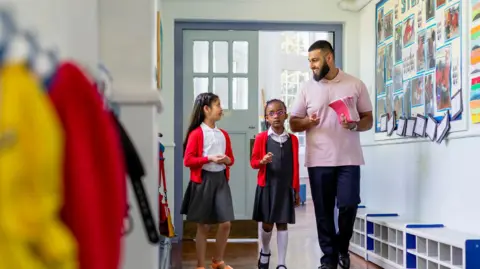 Getty Images
Getty ImagesPupils in England who missed school during the first week back in September 2024 were more likely to miss large parts during the rest of the year, figures suggest.
More than half (57%) of pupils who were partially absent in week one became “persistently absent” – missing at least 10% of school, according to government data first seen by the BBC.
By contrast, of pupils who fully attended the first week, 14% became persistently absent.
Education Secretary Bridget Phillipson said schools and parents should “double down” to get children in at the start of the 2025 term, which is this week for most English schools.
A head teachers’ union said more support was needed “outside of the school gates” to boost attendance.
Schools have always grappled with attendance issues, but they became much worse after the pandemic in 2020 and schools closed to most pupils during national lockdowns.
Attendance has improved since, but it remains a bigger problem than before Covid.
Overall, about 18% of pupils were persistently absent in the 2024-25 school year, down from a peak of 23% in 2021-22 but higher than the pre-Covid levels of about 11%.
The Department for Education (DfE) said the data from the first week of the 2024-25 school year showed the start of term was “critical” for tackling persistent absence.
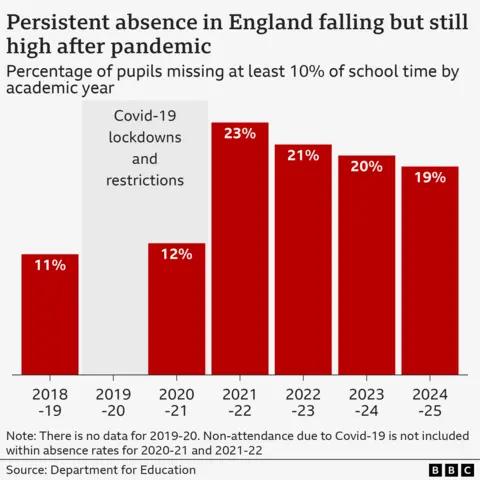
Karl Stewart, head teacher at Shaftesbury Junior School in Leicester, said his school’s attendance rates were higher than average and but there was a “definite dip” in the two years after Covid.
“I get why. Some of that wasn’t necessarily parents not wanting to send them in. It was because either they had got Covid or other things, they were saying, ‘We’ll just keep them off now to be sure’,” he said.
The school has incentives like awards and class competitions to keep absence rates down, and Mr Stewart said attendance had more or less returned to pre-Covid levels.
“When we have the children in every day the results are just better,” he said.
“If you’re here, that gives you more time for your teacher to notice you, for us to see all that good behaviour [and] that really hard work – and that’s what we want.”
But, like lots of schools, he said some parents still took their children on unauthorised term-time holidays to make the most of cheaper costs.
Others, he said, have taken children for medical treatments overseas to avoid NHS waiting lists.
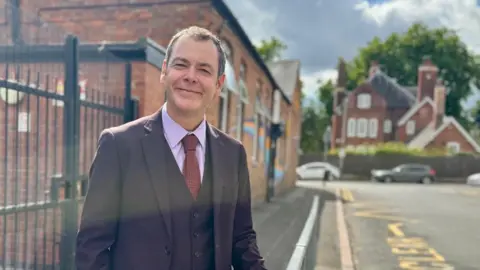
The education secretary said that while attendance improved last year, absence levels “remain critically high, putting at risk the life chances of a whole generation of young people”.
“Every day of school missed is a day stolen from a child’s future,” Phillipson said.
“As the new term kicks off, we need schools and parents to double down on the energy, the drive and the relentlessness that’s already boosted the life chances of millions of children, to do the same for millions more.”
The DfE said 800 schools were set to be supported by regional school improvement teams – through attendance and behaviour hubs.
These hubs are made up of 90 exemplary schools which will offer support to improve struggling schools through training sessions, events and open days.
It said it had appointed the first 21 schools that will lead the programme.
However, Pepe Di’Iasio, general secretary of the Association of School and College Leaders, said attendance hubs were not a “silver bullet” and a more “strategic approach” was needed.
“I think the government has worked really hard to improve attendance and it continues to be a priority for them, but there’s certainly more to do,” he told the BBC.
“So many of the challenges that [school leaders] are facing come from beyond the school gates – children suffering with high levels of anxiety, issues around mental health.”
He said school leaders wanted quicker access to support for those pupils and specialist staff in schools, but pupils also needed “great role models” in the community through youth clubs and volunteer groups.
The Conservatives said Labour’s Schools Bill had dismantled a “system that has driven up standards for decades”.
Shadow education secretary Laura Trott said: “Behaviour and attendance are two of the biggest challenges facing schools and it’s about time the government acted.”
She added: “There must be clear consequences for poor behaviour not just to protect the pupils trying to learn, but to recognise when mainstream education isn’t the right setting for those causing disruption.”
Additional reporting by Nathan Standley
Education
AI in the classrooms: How Bangladeshi schools are adapting to a new digital era
The recent explosion of Artificial Intelligence (AI) has pervaded numerous industries, going from a futuristic concept to an everyday reality. However, the impact of AI on schooling has been exceptionally staggering.
From helping students complete assignments to reshaping the way teachers think about homework and exams, AI is beginning to redefine education all over the world.
Bangladesh is no different.
Artificial Intelligence isn’t just coming to Bangladeshi classrooms—it’s already here. While its promise of convenience and quick solutions is quite alluring to students, the ever-growing presence of AI in schools has raised difficult questions: is learning actually taking place anymore or is it being replaced by answers generated not from thought, but from machines?
In schools across Bangladesh, AI tools like ChatGPT have quietly revolutionised how students complete their homework, how teachers prepare lessons, and how institutions rethink education altogether.
Is it a blessing or a bane?
Students have quickly adapted to using advanced AI chatbots like ChatGPT, making AI an unavoidable and integral part of academic life. From essays to homework, students are increasingly finding ways to rely on AI not just to work faster, but to sidestep studying altogether.
Many schools and educators have now been forced to accept that resisting AI is no longer an option. Schools must adapt to the new reality or risk becoming redundant.
Yafa Rahman, Vice Principal and Senior Business Studies Teacher of Adroit International School, told The Business Standard, “Talks about integrating AI in the school curriculum is a global concern, and my school has had meetings with Pearson Education on how to do that in the best possible manner as well as train teachers to use AI in a beneficial way while being able to spot unethical AI use. This is an ongoing discussion, and we will see many changes soon.”
Yafa explained that her school also employs AI tools to structure assignments and class content. Rather than banning AI altogether, she believes in channelling students’ fascination with technology into meaningful learning. “Students rely on technology so much that if we incorporate any technology into the learning process, students instantly become more interested,” she said.
Rethinking the curriculum
The convenience of AI comes with a heavy cost. Teachers are reporting a surge in AI-generated assignments. Entire essays, reports, and even personal reflections are being turned in with no human touch. And it’s getting harder to spot the difference.
Educators have responded by rethinking the very structure of education in the country. Oral assessments, in-class essays, and presentations have become increasingly common, as schools seek to test students’ independent thinking rather than their ability to reproduce AI-generated answers.
“For assignments meant to show knowledge and understanding, I’ve returned to using pencil and paper to prevent AI use. For reflective assignments, I encourage students to use AI but remind them to think critically. You do not always have to agree with what AI generated, and key facts and figures must be checked with reliable sources,” said Olivier Gautheron, a Science Teacher at International School Dhaka (ISD) who has earned the “AI Essentials for Educators” certification from Edtech Teachers in the US.
This hybrid approach reflects a wider consensus among educators that AI should not be ignored but incorporated responsibly, encouraging students to refine their critical faculties alongside their digital literacy.
It’s no longer just about stopping AI from being used. It’s about guiding how it’s used.
AI detection
Detecting AI-generated work isn’t straightforward. In universities, plagiarism software and AI detectors are standard. But in schools, teachers often rely on their personal knowledge of each student’s writing style and capability, using their instincts to identify when a student’s writing does not look like their own.
But Gautheron warns against over-reliance on intuition, preferring restraint over wrongful accusations.
“I believe it all comes down to knowing your students and their abilities,” he said. “There’s a high chance of mistakenly identifying student work as AI-generated when it’s not.”
He recalled an incident when he suspected a student of using AI, only to learn that the child had simply used software to improve grammar without altering the ideas. “This is perfectly acceptable, as the purpose of the assignment was for students to generate their own ideas,” he added.
He believes the solution lies not in advanced software but in dialogue. “Although software exists to detect AI, there are other softwares to make them undetectable. I believe that the best way to detect inappropriate use of AI is asking your students directly. If I feel that a student’s work quality is very different from previous tasks, simply asking them to clarify a few ideas of their work is enough.”
For resource-constrained schools, this approach is also pragmatic, since not every institution can afford detection software.
AI for teachers
Just like students, teachers are also increasingly turning to AI for lesson planning and content creation
Emran Taher, Cambridge examiner and senior English instructor at Mastermind School, sees AI as a game-changer.
“It is not just the students who use AI. Teachers and schools are using it too. I can keep my syllabus up-to-date and incorporate more relevant topics and examples instead of just relying on textbooks. This helps grab students’ interest while reducing issues like bunking classes.”
He also uses AI for personalised instruction. By feeding student data—age, class level, strengths, and weaknesses—into AI tools, he receives tailored recommendations that help him address individual needs. “There are no bad students, only bad teachers,” he said.
Striking the right balance
AI’s presence in schools reveals a tension: the same tool that can personalise learning and spark creativity can also be used to bypass real thinking. This balancing act between embracing innovation and preserving the essence of education appears to be the defining challenge of AI use.
However, there is no turning back. AI is already embedded in how schools operate. What matters now is how educators choose to respond. As Bangladeshi schools navigate this shift, teacher training, investment in digital infrastructure, and the development of ethical guidelines will all be crucial.
Some see AI as a threat to academic honesty. Others see it as a catalyst for overdue change in the old, rigid education system. But everyone realises that the role of teachers must evolve to address the new digital landscape.
Education
Education Ministry slammed for AI image of kids starting 1st grade
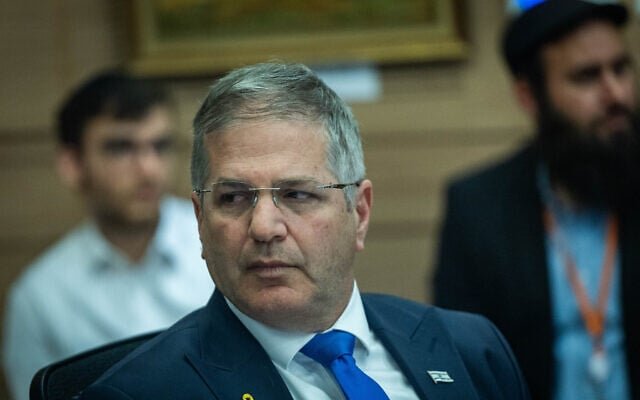
The Education Ministry was panned across social media over the weekend for posting an AI image to Facebook on Friday of a fictional sextuplets ostensibly starting first grade, ahead of the start of the school year on September 1.
The ministry posted a picture of the six children standing in front of a school with the caption: “Next week we go back to school! In the meantime, meet the only sextuplets in the country who are entering first grade: Oren, Omer, Uri, Nadav, Dvir and Gil Orenstein.”
The post then quoted their fictional mother, Ilanit, as saying: “I invested a lot in raising the children; it’s a great miracle that they were all born healthy. I took a two-year break from work to focus on raising the children and my husband was the sole breadwinner. I am the most excited in the world to see them grow up.”
No such sextuplets exist, and the photo was AI-generated. This fact was not initially made clear by the ministry. The post quickly drew a backlash on social media, with thousands of users slamming the ministry that is supposed to educate children for spreading a lie.
“One of your more embarrassing posts. The education system is collapsing, there are no teachers, no values, and schools are barely managing, and this is what you decide to post? A chauvinistic AI story about imaginary sextuplets with a mom who stays home and a father who supports them,” one person responded on Facebook, garnering 1,700 likes.
“Focus on improving education and not on degrading the conversation online,” she added.
Education Minister Yoav Kisch attends a meeting of the Knesset Education, Culture, and Sports Committee in Jerusalem, May 12, 2025. (Yonatan Sindel/Flash90)
Another commenter said the post was “absurd,” and “typical of the lazy and spineless” Education Minister Yoav Kisch, saying that “these are his values and what he promotes before the start of the school year.”
One commenter said that they asked ChatGPT what it thought of the post, saying that the AI chatbot said it was “highly problematic, especially coming from the Education Ministry.”
“The post undermines public trust [in the ministry], and trust is the foundation of the education system,” ChatGPT added, according to the commenter.
“This is the page that represents the places to which you send your children,” said another poster. “Time to consider homeschooling.”
The ministry later defended the upload, responding in a comment to its original post: “Okay, we admit these sextuplets are not really on the way to first grade, the photo was created with AI.
“We wanted to open the school year with a smile and to remind you that just like in school, on the web we also need to stop, check, and use our critical thinking,” it asserted.
“Wishing everyone a curious, fun school year full of good surprises,” its second post said.
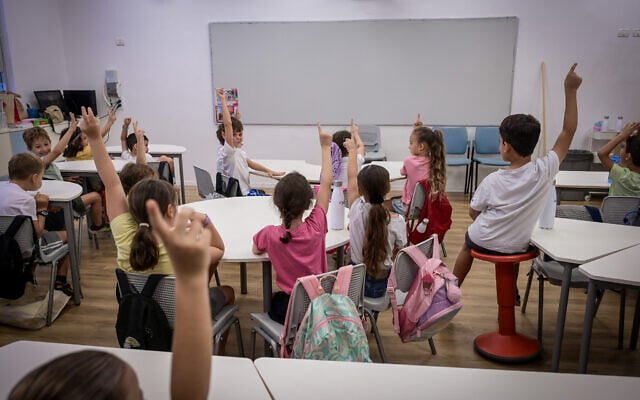
Illustrative photo of students on the first day of school, at the Gabrieli Carmel School in Tel Aviv, on September 1, 2024. (Avshalom Sassoni/Flash90)
The Education Ministry under Kisch has undergone a tumultuous year, which included several teacher strikes, budget issues and a controversial change to public school curriculum, which mandated an hour of bible study each week for all students in first to twelfth grade, as well as additional mandatory classes on Zionism and “Israel’s wars and rebirth.”
Schools will also be required to bring students on tours of Jerusalem and Jewish heritage sites around the country, with an emphasis on sites in the West Bank.
-
Tools & Platforms3 weeks ago
Building Trust in Military AI Starts with Opening the Black Box – War on the Rocks
-

 Ethics & Policy1 month ago
Ethics & Policy1 month agoSDAIA Supports Saudi Arabia’s Leadership in Shaping Global AI Ethics, Policy, and Research – وكالة الأنباء السعودية
-

 Events & Conferences3 months ago
Events & Conferences3 months agoJourney to 1000 models: Scaling Instagram’s recommendation system
-

 Jobs & Careers2 months ago
Jobs & Careers2 months agoMumbai-based Perplexity Alternative Has 60k+ Users Without Funding
-

 Business1 day ago
Business1 day agoThe Guardian view on Trump and the Fed: independence is no substitute for accountability | Editorial
-

 Funding & Business2 months ago
Funding & Business2 months agoKayak and Expedia race to build AI travel agents that turn social posts into itineraries
-

 Education2 months ago
Education2 months agoVEX Robotics launches AI-powered classroom robotics system
-

 Podcasts & Talks2 months ago
Podcasts & Talks2 months agoHappy 4th of July! 🎆 Made with Veo 3 in Gemini
-

 Podcasts & Talks2 months ago
Podcasts & Talks2 months agoOpenAI 🤝 @teamganassi
-

 Jobs & Careers2 months ago
Jobs & Careers2 months agoAstrophel Aerospace Raises ₹6.84 Crore to Build Reusable Launch Vehicle



